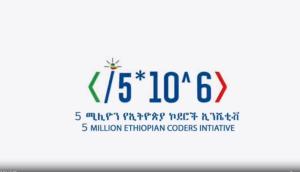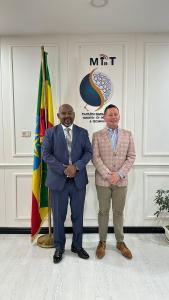Technology - ENA English
Technology
FM Gedion Meets with UN Under-Secretary-General and Special Envoy for Digital and Emerging Technologies
Apr 1, 2025 270
Addis Ababa, April 1, 2025 (ENA)--Minister of Foreign Affairs, Gedion Timothewos received the United Nations Under-Secretary-General and Special Envoy for Digital and Emerging Technologies, Amandeep Singh Gill, at his office. On the occasion, Gill called on Ethiopia to be part of the new UN Initiative on Digitalization and Artificial Intelligence (AI) and ensure its active role. The new UN Initiative on Digital and Emerging Technologies was established to develop advanced governance framework and build capacity in the field of artificial intelligence. Foreign Minister Gedion highlighted that Prime Minister Abiy Ahmed has already initiated the establishment of institutions such as the Ethiopian Artificial Intelligence Institute to emphasize the importance of digitalization for national development. The Minister also affirmed Ethiopia's commitment to actively engaging as a key member of the newly launched initiative.
More than Half a Million Citizens Taking Training in Ethiopian Coders Initiative
Mar 26, 2025 825
Addis Ababa, March 26, 2025(ENA)—The Ministry of Innovation and Technology said that over 580,000 citizens are enrolled in the Five Million Ethiopian Coders program nationwide. The 5 Million Ethiopian Coders Initiative has become in Ethiopia’s digitalization journey to equip the youth population with coding skills and fostering digital literacy, with the broader goal of training five million young Ethiopians in coding to boost the country's technology sector and create more opportunities for employment and innovation. The project envisages training five million youth on web programming, developing android, data science, AI and to enable them acquire skills on basic digital technologies over the coming three years. The project envisages training five million youth on web programming, developing android, data science, AI and to enable them acquire skills on basic digital technologies over the coming three years. Yeshurun Alemayehu, Innovation and Technology State Minister for ICT and Digital Economy Sector told ENA that the program is vital for enhancing digital skills for the nation. According to him, the initiative is laying foundation to make Ethiopians globally competitive through digital skills, he said. Commending the implementation of the initiative in Addis Ababa, Dire Dawa, and Harar, the state minister urged other regions to strengthen efforts and the MiNT will continue its support. He also encouraged the youth to apply skills acquired for innovation.
Ethiopia to Host Ethiopian Tech Expo 2025 in May
Mar 26, 2025 976
Addis Ababa, March 26, 2025 (ENA) ---- The Information Network Security Administration (INSA) and the Ethiopian Artificial Intelligence Institute (EAII) today announced the "Ethiopian Tech Expo 2025"—a landmark international event is scheduled from 16-18 May 2025 in Addis Ababa at the Addis International Convention Center. INSA Director-General Tigist Hamid said that the expo is unprecedented and added it is unique in its organization, participant diversity, and thematic scope, positioning it as the largest tech exposition in East Africa. To be jointly hosted by INSA and EAII, with the Cyber Security Council as a co-host, the expo will feature cutting-edge advancements in cybersecurity, artificial intelligence, fintech, smart city technologies, and tech education, Tigist stated. Over 10,000 stakeholders are expected to participate in the three-day event. Tigist explained the Tech Expo 2025 will serve as a pivotal platform to showcase Ethiopia's rapid technological transformation, aligning with the nation's Digital Ethiopia 2025 strategy. With Digital Ethiopia 2025 strategy approaches to end, we are preparing to launch the 2030 digital strategy; she said adding this expo underscores our commitment to sustained digital progress and make Ethiopia a digital hub. EAII Director-General, Worku Gachena, emphasized the expo's strategic importance in promoting Ethiopia’s technological image and creating market linkages. This event is crucial to showcase the nation's progress in the area of artificial intelligence (AI) and related sectors, he noted. The EAII is dedicated to deploying AI solutions across all sectors, addressing challenges related to data and skilled workforce development. This expo will serve as a vital showcase of our achievements, he said. The Ethiopian Tech Expo 2025 contributes to the nation's digital future by promoting innovation, security and transformation. Worku added that a platform will be created for experience sharing in the sector, particularly by encouraging the broad participation of private technology actors. The expo aligns with the African Union's Agenda 2063 digitalization journey and also announced that an AI competition will be held, he said.
PM Abiy Encourages Young Innovators to Create solutions in Service of Ethiopia
Mar 24, 2025 1698
Addis Ababa, March, 24, 2025 (ENA)— Prime Minister Abiy Ahmed underscored that Ethiopia’s national aspirations for self-sufficiency and import substitution can only be achieved through continuous innovation and hard work. “I am pleased to see our ambitious youth channeling their talents and ideas into meaningful and practical innovations through the Skill Ethiopia challenge,” the Premier said in a social media post. Congratulating those already engaged in innovation, the Prime Minister also encourages other young people to observe the pressing needs of communities and strive to create solutions in service of their nation. He further stated that: “Additionally, I call upon all stakeholders, including the business community, to support these and other young innovators in scaling up their production capabilities.”
AU Highlights AI’s Transformative Potential for Peace, Security and Governance
Mar 22, 2025 1765
Addis Ababa, March 22, 2025 (ENA) -- The African Union Commission Chairperson, Mahmoud Ali Youssouf, has underscored the transformative role of Artificial Intelligence (AI) in advancing peace, security, and governance across the continent. Speaking at the 1267th Peace and Security Council (PSC) meeting at the ministerial level, Mahmoud Ali Youssouf, Chairperson of the AU Commission, called for proactive measures to harness AI’s potential for the benefit of Africa. In his address, Chairperson Youssouf emphasized AI’s immense promise in addressing Africa’s development challenges. “With AI holding immense promise for advancing development and solving persistent challenges, from boosting agriculture to improving healthcare and education, we have entered into a unique time of the human experience,” he said. He highlighted AI’s potential to revolutionize conflict prevention, counterterrorism, and governance. “In peace, security, and governance, AI presents organizations such as the African Union and our Member States a strategic tool that could potentially revolutionize our ability to predict and prevent conflicts, counter terrorism, enhance security operations, and make governance more effective across the continent,” Youssouf stated. The Chairperson noted the pivotal role of AI in preventing conflicts and sustaining peace. “Advanced early-warning systems powered by AI now analyze vast amounts of data—social media trends, satellite imagery, and economic indicators—to detect early signs of instability,” he explained. Youssouf also highlighted AI’s contributions to peacekeeping and mediation. “AI tools are being used to map the interests and grievances of different conflict parties. Such tools can now assist peace mediators in choosing effective solutions,” he said. “If used effectively, the integration of AI into peace efforts will allow us to respond faster and smarter to prevent violence across the continent.” On counterterrorism, Youssouf pointed out how AI is transforming efforts to combat one of Africa’s greatest challenges. “AI-powered surveillance tools can track terrorist movements, analyze suspicious financial transactions, and detect radicalization patterns on social media platforms,” he said. He also emphasized AI’s role in financial intelligence tracking. “Through AI-driven forensic analysis, illicit cash flows can identify abnormal financial behaviors, to disrupt the financing of terrorist operations,” Youssouf added. The Chairperson stressed the importance of AI in improving governance and transparency. “AI can enhance governance by tracking public spending, detecting fraud, and reducing corruption,” he said. In elections, the Chairperson stated that AI can detect fraud, monitor manipulation, and analyze voting patterns to strengthen democracy. Youssouf commended the PSC for its proactive steps in addressing AI-related issues, including the establishment of the African Union AI Advisory Group on Artificial Intelligence, Impact on Peace, Security, and Governance. He urged member states to develop strong AI regulations, strengthen counterterrorism capabilities, enhance regional and international cooperation, invest in capacity building, and monitor AI’s societal impact. Chairperson expressed optimism about AI’s potential to transform Africa recognizing its potential in transforming peace, security, and governance across Africa. “For this to happen, Africa must embrace this opportunity with foresight. Collectively, I believe we can use AI for peace and prosperity.” The Chairperson’s statement reflects the AU’s commitment to leveraging AI as a strategic tool for development, peace, and security, while ensuring its governance aligns with Africa’s unique needs and aspirations.
Ethiopia Making All-out Efforts to Become Self-Reliant: Deputy Prime Minister Temesgen Tiruneh
Mar 9, 2025 2583
Addis Ababa, March 9, 2025 (ENA) -- Ethiopia is implementing plans to attain its goal of self-reliance in all sectors, Deputy Prime Minister Temesgen Tiruneh stated. In a message he posted on his social media page in connection with the newly inaugurated SkyWin Aeronautics Industries, a company that manufactures unmanned aerial vehicles for both civilian and military use, Deputy Prime Minister Temesgen noted that the implementation of plans is achieving success at an unexpected pace. "We all must continue to work day and night in our respective sectors for the growth and prosperity of our country, without being complacent with the successes we have achieved so far," he emphasized. He congratulated all Ethiopians for the remarkable achievements made thus far.
Nat'l Business Portal Expansion Project Launched
Mar 6, 2025 2631
Addis Ababa, March 6, 2025 (ENA)-- The Ministry of Innovation and Technology has launched the National Business Portal (NBP) expansion project, a web-based platform, where the government e-services and various e-service providing government agencies are brought together in a centralized platform. The portal was initially developed by the Ministry of Innovation and Technology in 2019. In the beginning, the portal offered a one-stop service for various processes delivered by only the Addis Ababa City Administration, such as issuance of construction permits and registration of property. Having assessed the innovative service launched, the ministry identified that tremendous improvements were made in the service delivery, time efficiency and decreased transaction cost for both the public and service providers. Then, the Ministry of Innovation and Technology initiated a plan to expand and scale up the services to other parts of the country. While the overall objective of the project was improving Ethiopia's business climate, it also targeted the provision of technical support by the ministry to the different Ethiopian government agencies to develop e-transactional portals for potential e-government processes. Accordingly, Adama, Bahir Dar, and Dire Dawa cities are allowed to provide their services online, mainly the issuance of construction permits, the ministry stated. The expansion has also introduced new features, for instance a payment gateway where customers can be able to pay the required service fees online, it was indicted. The National Business Portal expansion project was launched with presence of Minister of Innovation and Technology Belete Molla and regional and city administrations representatives.
PM Abiy Announces Ethiopia Has Secured 30 Million Dollars from Ammunition Export Deal
Mar 6, 2025 3161
Addis Ababa, March 6, 2025 (ENA)-- Prime Minister Abiy Ahmed has announced that Ethiopia has secured contracts for the export of ammunition valued at over 30 million USD in the past three months alone, during a visit to the newly completed Homicho Ammunition Engineering Complex. The complex, a key component of the Ethiopian Defense Industry Sector, now produces a wide range of munitions not only for domestic use but also for the international market. "We have signed contracts with numerous countries for the sale of ammunition, generating over 30 million USD in just the last three months," stated Prime Minister Abiy Ahmed during his visit. He highlighted the complex's ability to produce a variety of munitions, including those for Kalashnikov rifles, Bren guns, sniper rifles, DShK heavy machine guns, and tank artillery. The Prime Minister, a former soldier, emphasized the strategic importance of this development, stating, "As you can see today, Ethiopia can produce all types of artillery, not just for ourselves but for the market. We have built a factory with sufficient capacity, equipped with highly modern robotics, capable of high-volume production." He expressed immense pride in the rapid development of the complex, which was completed in two years. "The fact that we have moved from importing Kalashnikovs and sniper rifles to producing and exporting them, and that this capability was built in such a short time, fills me with great honor and joy," he said. Prime Minister Abiy Ahmed underscored the significance of self-reliance in military production, drawing from his own experience as a soldier. "I am a soldier. I understand the gaps in military supplies. I know how difficult it is when things are lacking during operations. Now, Ethiopia does not have to worry about such shortages," he asserted. While acknowledging previous attempts at domestic ammunition production, he noted that Ethiopia had relied heavily on imports until recently. "Although there were previous attempts to manufacture bullets domestically, the country relied on imports until three years ago. Now, Ethiopia has developed the capability to produce ammunition locally and even export it," he stated. He further elaborated on the broader self-sufficiency initiatives, "Even at the national level, our defense forces now produce its own uniforms and footwear, supplementing any shortfalls from local manufacturers." The Prime Minister stressed the need for strategic capabilities to safeguard Ethiopia's future. "Ethiopia is a large country, and it must ensure its own security and pass on a secure nation to future generations. If Ethiopia does not build such strategic capabilities, it will be vulnerable to attack," he elaborated. He praised the nation's human capital, "We have brilliant minds and heroic soldiers. We have largely overcome the limitations we faced in terms of logistic supply." He highlighted the shift from importing to exporting essential military supplies. "We used to import uniforms, military boots, bullets, Kalashnikovs, and sniper rifles. Now, we are producing and selling them." The Prime Minister connected the military production achievements to broader economic goals. "This achievement, along with our progress in environmental protection, mineral production, and AI/ICT, contributes to Ethiopia's resilience and progress. Industry is one of the five pillars of Ethiopia's economy, and this year, we expect a 12 percent growth in the sector. The growth in the defense industry is particularly promising, indicating that Ethiopia is emerging stronger and more secure.", he said. "Ethiopia is recovering. Our capacity to initiate, excute and complete projects has increased. Seeing an industry that meets our needs and exports within one or two years is a source of great honor and pride," he said.
Russia Reaffirms Commitment to Educating Talented Ethiopian Youth in Technology
Mar 5, 2025 3546
Addis Ababa, March 5, 2025 (ENA)—Russia is committed to supporting talented Ethiopian youth in pursuing their education in technology and education, Russian Center for Science and Culture (Pushkin) Director Vladimir Golovachev said. The director added that the Russian government has been offering scholarships for Ethiopian students, with 100 scholarships available for the academic year 2025/26, most of which are for technological specialties. This was stated at a half-day forum aimed at enhancing technological and educational collaboration between Ethiopia and Russia today. Pointing out that the industry integrated educational system of Russia as one of the leading technological education frameworks globally, Golovachev noted that such types of forum would be developed into sustainable cooperation that eventually lead to business projects benefiting both Ethiopia and Russia. On his part, Technology Development and Transfer Lead Executive at Ministry of Innovation and Technology, Teklemariam Tessema, noted that international cooperation is beneficial for countries like Ethiopia in terms of educating the youth in the technological landscape. “Partnering with countries like Russia is more beneficial due to the historical relationship between the two countries. The historical relationship between Ethiopia and Russia has been characterized by mutual respect and sense of solidarity,” the lead executive said. According to him, a well-educated workforce equipped with the skills and knowledge to innovate in an ever-evolving technological landscape is crucial. With a population of approximately 130 million people, 70 percent of whom are youth, Ethiopia must equip the youth with the necessary skills and knowledge to overcome challenges and create a better future for all, he elaborated. Teklemariam believes that partnership with Russian universities could provide valuable resources and expertise, enabling Ethiopians to thrive in the technological age. Collaborating with universities in Russia, the country with advanced technological capability, could provide valuable knowledge and resources to gain the skills needed for the technological age in Ethiopia, he said. The lead executive underscored, “By working together we can exchange expertise, promote innovations and foster growth in the technological sector, ultimately leading to improved opportunities and economic development for Ethiopia.”
Ongoing Endeavors Would Position Ethiopia Africa’s Digital Transformation Hub, Says Ministry
Mar 1, 2025 2394
Addis Ababa, March 1, 2025 (ENA)—The Ministry of Innovation and Technology (MIT) highlighted Ethiopia’s ongoing endeavors to become the center of Africa's digital revolution. State Minister of Innovation and Technology, Yishurun Alemayehu, told ENA that infrastructures and strategies developed under Digital Ethiopia 2025 are accelerating the nation's digital transformation. Tremendous efforts are being made to position Ethiopia as the hub of Africa’s digital transformation, he elaborated. According to the State Minister, initiatives are underway to build digital infrastructure across the country, which will also facilitate cross-border e-commerce trade. Ethiopia is set to host an international forum, where policymakers, sector experts, and leaders will gather to discuss the realization of Digital Africa, he pointed out. Yishurun further added that both the e-commerce and electronics strategies derived from Digital Ethiopia 2025 have already been approved and are being implemented. The State Minister mentioned that startups, along with initiatives such as the five million Coders training program, are key enablers of Ethiopia’s digital transformation, further affirming that strategies and infrastructures developed under Digital Ethiopia 2025 are fundamental to the nation’s ongoing digital transformation. These efforts are making a significant contribution to the sector’s development by designing an artificial intelligence strategy and establishing specialized institutions, he said, adding that Ethiopia has also established a robust cyber-security institution, fostering a competitive environment in the private sector, and building a capacity that extends beyond its borders, providing Africans with access to advanced digital experiences.
Digitalization Reshaping Economies, Unlocking New Opportunities: Minister of Innovation & Technology
Feb 26, 2025 2163
Addis Ababa, February 26, 2025 (ENA)—Digitalization is unlocking new opportunities and redefining Africa’s position in the global market, Minister of Innovation and Technology Belete Molla said. Accelerated Digital Transformation (ADT) summit 2025 is underway in Addis Ababa with the theme "Harnessing a New Wave of Opportunity". The Ministry of Innovation and Technology co-hosted the summit with Extensia, bringing together hundreds of decision-makers, investors, technology providers, and entrepreneurs who share a common vision for a digitally empowered Africa. Addressing the summit, Belete said that the summit is a Pan African gathering of policy makers, regulators, industry leaders and investors with the goal of accelerating Africa's digital transformation. "Today, we stand at a critical juncture. Across the continent, digitalization is reshaping economies, unlocking new opportunities, and redefining Africa’s position in the global market, “the minister said. The potential of Business Process Outsourcing (BPO), digital services, and ICT-driven industries presents a pathway to economic resilience, job creation, and inclusive growth, the minister further pointed out. However, realizing this potential requires more than just ambition—it demands collaboration, innovation, leapfrogging, and decisive action, he said. According to him, the continent’s greatest asset is not just its resources, but its people—the brilliant minds, bold entrepreneurs, and forward-thinking leaders who are driving innovation from Addis Ababa to Accra, from Cape Town to Casablanca. "The time for action is now. Let us seize the opportunities before us, work together across borders, and ensure that Africa not only embraces the digital era but leads it," he stressed. By forging strategic partnerships and showcasing cutting-edge solutions, the ADT Summit is setting the agenda for Africa’s digital future, it was indicated. Accordingly, the ADT Summit 2025 continues to build on the foundation for a digitally transformed Africa.
Ethiopia Introduces Domestically Produced E-Passport
Feb 21, 2025 7099
Addis Ababa, February 21, 2025 (ENA)—Ethiopia's introduction of a new electronic passport equipped with advanced security features and cutting-edge technology marks a significant leap forward for the country, President Taye Atskeselassie noted. An electronic passport (e-passport) domestically produced was unveiled at Science Museum today. President Taye said on the occasion the incorporation of cutting-edge travel documents and advanced security features into the new electronic passport are major achievements. The implementation of the e-passport not only enhances the country's positive image but also reflects the value it placed on its citizens, he added. The president further stated that the passport plays indispensable role in preventing fraud. Modern documents, in addition to facilitating smooth movement of people, promote trade, and are essential for securing legal employment opportunities. Moreover, the e-passport will ensure quality and transparent service delivery to citizens. On her part, Immigration and Citizenship Service Director-General, Selamawit Dawit, explained that the e-passport contains biometric information, including fingerprints, facial recognition data, and electronic chip. She stated that the e-passport has enhanced security features designed to streamline immigration procedures and prevent fraudulent information and forgery. Furthermore, Selamawit affirmed that this will reduce the risks of producing counterfeit passports or using another person's passport for illegal purposes. The director-general also highlighted the e-passport's significance in effectively controlling Ethiopia's air and land borders and safeguarding national security. The passport's interior pages feature images showcasing Ethiopia's heritage and historical sites, and it differs from the previous passport in color and design. The passport meets international standards and has secured international recognition. The e-passport was produced domestically by the Ethiopian Investment Holdings and TOPPAN Security Ethiopia Share Company. Present at the inauguration ceremony were high government officials, including House of People's Representatives Speaker Tagesse Chafo, House of Federation Speaker Agegnehu Teshager, Federal Supreme Court President Tewodros Mihret, Deputy President of the Prosperity Party and Head of the Democratic System Building Coordination Center Adem Farah, and others.
Paris AI Summit Kicks off This Week, Draws World leaders & Tech Entrepreneurs
Feb 10, 2025 3499
Addis Ababa, February 10, 2025 (ENA)—Starting from the early days of this week, France will be the centre of the artificial intelligence (AI) debate, with the official beginning of the third edition of the AI Action Summit. India’s Prime Minister Narendra Modi is co-hosting the summit with French President Emmanuel Macron, in an effort to involve more global actors in AI development. The geopolitics of artificial intelligence will be in focus at this major summit in Paris where world leaders, technology executives and experts will try to hammer out agreements on guiding the development of the rapidly advancing technology, it was reported. They are also anticipated to discuss ways of safely embracing artificial intelligence at a time of mounting resistance to heavy-handed red tape that businesses say stifles innovation. It’s the latest in a series of global dialogues around AI governance with two previous editions held in the UK in 2023, and a smaller gathering in Seoul, South Korea, last year. It also comes amid the meteoric rise in popularity of the low-cost Chinese foundational model DeepSeek, which has shaken up the industry. The Paris Summit aims to achieve three major objectives: Provide access to independent, safe and reliable AI to a wide range of users; develop AI that is more environmentally friendly; and ensure global governance of artificial intelligence that is both effective and inclusive. The Summit will focus on five major themes, including public service AI, future of work, innovation and culture, trust in AI, and global governance of AI. The summit is expected to announce a key outcome—a foundation that will look at AI in the public interest to cater to the needs of the Global South.
Mastercard Aims to Strengthen Commitment to Uganda with New office in Kampala
Feb 6, 2025 4056
Addis Ababa, February 6, 2025 (ENA) -- Mastercard has announced the opening of its first office in Uganda, marking a significant milestone in its expansion across East Africa. This strategic move underscores Mastercard's dedication to fostering financial inclusion and accelerating digital transformation in the region. With Uganda’s economy projected to grow at 6.2 percent by 2025, the country is poised for sustained expansion. Mastercard’s physical presence in Kampala aims to enable deeper collaboration with local stakeholders to deliver tailored solutions that address the unique needs of Ugandan consumers and businesses, contributing to this growth. Mastercard’s efforts align with the government's ‘Digital Uganda Vision,’ a transformative initiative to harness digital technologies for national development. As part of this commitment, Mastercard and the Ministry of ICT & National Guidance have signed an MoU to accelerate the adoption of digital solutions that enhance government services and drive financial inclusion. Last year, in compliance with the National Payment Systems Act 2020, Mastercard was granted a Payment System Operator (PSO) License by the Bank of Uganda. This license endows Mastercard to provide essential services such as settlement and clearing operations within Uganda, further enabling the company to act as a payment system operator for domestic transactions. The opening of the Kampala office is part of Mastercard's broader strategy to expand its footprint across Africa, with existing offices in Cairo, Casablanca, Johannesburg, Lagos, Nairobi, Port Louis, and Accra.
Ethiopia Making Rapid Progress in Building Inclusive Digital Infrastructure, Economy: DPM Temesgen
Jan 27, 2025 5510
Addis Ababa, January 27, 2025 (ENA)—Through the implementation of Digital Ethiopia 2025 Strategy, Ethiopia has reached critical stage to build inclusive digital economy and improve government services, Deputy Prime Minister Temesgen Tiruneh stated. Speaking at the official opening of an exhibition and workshop on Ethiopia's digital transformation journey at the Science Museum, Temesgen highlighted the country's ongoing efforts in technological advancements. Since its launch, Digital Ethiopia Strategy has laid a strong foundation for economic growth and digital transformation, the deputy prime minister said. Starting from 2012 Ethiopian fiscal year, Ethiopia has been implementing the Digital Ethiopia 2025 Strategy to seize the opportunities and address the challenges posed by technological growth. The deputy prime Minister emphasized that the government's expansion of critical infrastructure is essential to fostering a digital economy that ensures equitable access for all Ethiopians. He also pointed out the implementation of new legal and operational frameworks that have significantly transformed the digitalization of government services, enabling faster and more efficient services for citizens. Acknowledging the private sector's proactive role in expanding data centers and introducing new digital services, DPM Temesgen noted the remarkable growth of digital financial services, payments, and electronic commerce during the strategy’s implementation. Temesgen underscored the critical foundational activities that have been carried out to build a robust digital economy. Regarding key digital infrastructures identified in the Digital Ethiopia Strategy, he cited the digital national identity card, implemented since 2014 Ethiopian fiscal year, as one of the most important steps. To this effect, the deputy prime minister revealed that over 1,000 registration sites have been established across the country in recent years, where more than 11.5 million citizens have been successfully registered. The government has established digital transformation council to facilitate the integrated transition of digital transformation ensuring its security, efficiency, citizens’ benefits, protect wastage and fosters rapid progress. DPM Temesgen highlighted the development of Digital Government Strategy and the Electronic Commerce Strategy to further accelerate the digital transformation. These strategies, which will soon be approved and implemented, are expected to play a pivotal role in improving service delivery, modernizing business practices, and creating a more inclusive digital society. Recalling the Digital Ethiopia 2025 Strategy is nearing to end, the deputy prime minister noted that preparations are already underway for the development of the Digital Ethiopia 2030 Strategy.
Heads of State, Business Leaders Gather in Dar es Salaam for Mission 300 Africa Energy Summit
Jan 27, 2025 4147
Addis Ababa, January 27, 2025 (ENA)—African heads of state, business leaders, and development partners have converged today in Dar es Salaam, Tanzania, for the Mission 300 Africa Energy Summit. They are anticipated to commit to ambitious reforms and actions to expand access to reliable, affordable, and sustainable electricity to 300 million people in Africa by 2030. Mission 300 is an unprecedented collaboration between the African Development Bank, the World Bank Group, and global partners to address Africa’s electricity access gap using new technology and innovative financing. Nearly 600 million Africans lack electricity, which is crucial for development and job creation, it was learned. Several heads of state and government from Africa are joining more than 1,000 other participants—with strong representation from the private sector—at the January 27-28 summit. Together, they will chart Africa’s course toward universal access to energy. This week’s summit is expected to yield two significant outcomes: the Dar es Salaam Energy Declaration, outlining commitments and practical actions from African governments to reform the energy sector, and the first set of National Energy Compacts, which will serve as blueprints with country-specific targets and timelines for implementation of critical reforms. In the first phase, 12 countries will present their energy compacts: Chad, Côte d’Ivoire, the Democratic Republic of Congo, Liberia, Madagascar, Malawi, Mauritania, Niger, Nigeria, Senegal, Tanzania, and Zambia. Other African countries are expected to develop their compacts in subsequent phases. The partnerships forged and commitments made by the continent’s leaders and changemakers gathering in Dar es Salaam this week will shape the continent’s journey toward achieving universal energy access, transforming millions of lives, and driving sustainable development and job creation
Ethiopia Experiencing Remarkable Progress in Digital Transformation: Minister
Jan 21, 2025 4550
Addis Ababa, January 20, 2025 (ENA) ----Ethiopia has been achieving impressive achievements in digital transformation, according to the Innovation and Technology. A three-day Internet Development Conference (IDC) that aims to address connectivity challenges, enhance regional cooperation, and foster the growth of a robust internet economy among countries of the IGAD region opened today. Opening the conference, Innovation and Technology Minister Belete Molla said the conference is a testament to the tremendous progress made in advancing the digital landscape in Ethiopia and the broader IGAD region. The internet has become an indispensable tool for economic growth, social development, and communication, he noted, adding that cross border connections empower individuals and drive innovation. According to the minister, Ethiopia is experiencing remarkable progress in digital transformation. “Ethiopia has achieved impressive milestones in expanding telecom infrastructure, though still there are a lot of gaps that needs to be addressed. The 4G coverage is expanded to 34.8% of the population and the 5G services is launched in 14 towns.” The number of mobile subscriber base has topped 80.5 million and broadband users have surpassed 45 million. These and initiatives like Telebirr, with over 51.54 million users, “demonstrate the power of digital innovation to drive financial inclusion and transform how Ethiopians conduct transactions,” he added. While celebrating achievements, the minister stated that Ethiopia remains aware of the challenges that lie ahead, stressing the need to continue bridging the digital divide by ensuring that all Ethiopians, regardless of their location or background, can reap the benefits of the digital revolution, prioritizing cyber-security, data privacy, and digital literacy to guarantee that the digital future is secure and equitable. At present, Belete revealed that the nation is laying the groundwork for an even more ambitious vision, Digital Ethiopia 2030 strategy. The strategy aims at realizing building a truly inclusive and prosperous digital future for Ethiopia on the successes of the current initiatives. The minister further reaffirmed his country’s commitment to work closely with IGAD countries to address internet challenges and to build a more inclusive and interconnected digital future for the IGAD region and beyond by exploring ways to improve Internet infrastructure, enhance digital literacy, and promote responsible use of the internet. On his part, Internet Society Ethiopia Chapter President Asrat Mulatu stressed the importance of regional collaboration and collective commitment in enhancing digital infrastructures to address challenges of unevenly distributed internet access, limited infrastructures and cyber security threats.
Internet Dev't Conference to Enhance Digital Infrastructures in IGAD Region Kicks Off
Jan 21, 2025 3733
Addis Ababa, January 20, 2025 (ENA) ---- The Internet Development Conference (IDC) 2025 Kicked off in Addis Ababa to lay the foundation for a stronger, more integrated Internet ecosystem in the IGAD region, The three-day conference brought together key players to address the region’s connectivity challenges, enhance regional cooperation, and foster the growth of a robust Internet economy. It is anticipated to serve as a platform for knowledge sharing, professional networking, and collaboration on critical initiatives such as establishing Internet Exchange Points and supporting community networks across the region. The objective of the conference is to lay the foundation for a stronger, more integrated Internet ecosystem in the IGAD region, which includes countries like Ethiopia, Kenya, Uganda, Somalia, South Sudan, and Djibouti. Particularly, the conference would identify key obstacles affecting internet development in various IGAD countries and explore practical solutions. In this regard, the conference is expected to facilitate cross-border learning and exchange of technical expertise to improve internet infrastructure; encourage collaboration among countries in the sub-region to support the implementation of the Africa Continental Free Trade Area; and foster the growth of community networks in underserved areas.
Trainee Coders Laud Impact of Ethiopian Coders Initiative
Jan 9, 2025 5098
Addis Ababa January 9/2025 (ENA)—Youth trainees from Afar, Sidama, and Harari regions have commended the impact of the ‘Five Million Ethiopian Coders’ training in helping them perform better. Recall that the 5 million Ethiopian Coders Initiative, the large-scale capacity-building project for the country’s youth, was launched by Prime Minister Abiy Ahmed in July, 2024. The trainees told ENA that Ethiopian coders training is instrumental for youth to quickly adapt to modern technologies emerging in changing circumstances. Shambel Mohammed, an expert at the Ethiopian Electric Utility in Afar region, said the Ethiopian coders training has enabled him to carry out his job better. Stating that working with digital technology is the preferred way at the global level, he added that taking advantage of the opportunities provided by the government enables acquiring skills that allow you to connect with different countries around the world. Another expert from Sidama Regional State Science and Technology Agency, Robel Daniel said the training is crucial in enabling the generation to quickly adapt to modern technologies in the fast changing world. For Robel, the training is crucial to realize the country's ambitions in its endeavors to build a digital economy by producing a skilled workforce. On his part, Ethiopian Coders Trainer at Harari Regional State Innovation and Technology Agency, Idris Sefa noted that technology has been making life easier. According to him, the training will help the youth to keep pace with the timely demands, especially by understanding and using digital and complex technologies. It is also vital to enable the country to reach the global level in digital technology, he added. The 5 Million Ethiopian Coders initiative aims to provide digital literacy training for 5 million Ethiopian youth, equipping them with essential digital skills for education, life, and work. The program will empower the youth in technology which equips them to seize on economic opportunities. Developing digital literacy among citizens, especially youth, is crucial for competitiveness and inclusive growth. Equipping the youth with digital literacy will enable them to actively contribute to Ethiopia’s development.
World’s Leading Data and Analytics Group Eyes Information, Technologies Sectors in Ethiopia
Jan 5, 2025 5360
Addis Ababa January 5/2025 (POA)—Kagool, a leading global data and analytics group, and Micro Tech London is navigating Ethiopia’s opportunities in the information technology as well as emerging technologies sectors. Kagool also disclosed its plan to open its regional delivery center in Addis Ababa, it was learned A delegation from the group has visited Ethiopia to assess opportunities in these spheres, according to the Ministry of Innovation and Technology. The delegation have had successful meetings with Ethiopia’s Minister of Innovation and Information Technology, Director Generals for Information Network Security Agency, and Artificial Intelligence Institute, CEO for ICT Park, Director General for Ethiopian Diaspora Agency, as well as representatives of the Ministry of Labor and Social Affairs. Acknowledging Ethiopia’s growing competitiveness and government’s commitment to harness opportunities in the sector, the delegation has decided to continue partnership with the Government in the sector. The decision by Kagool to open its regional delivery center in Addis Ababa is also anticipated to bring the latest digital transformation and AI capabilities into Ethiopia and across Africa using Addis at its gateway.
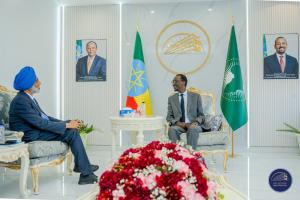
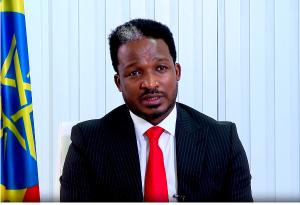
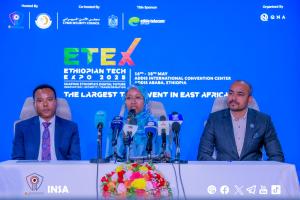
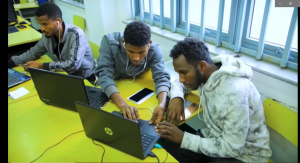
.png)
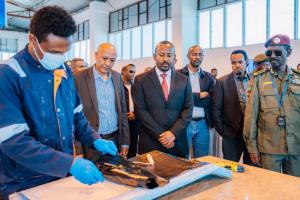

.png)

.jpg)
.jpg)
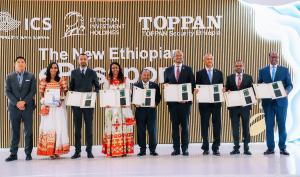

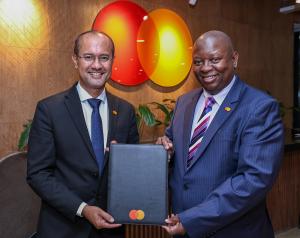
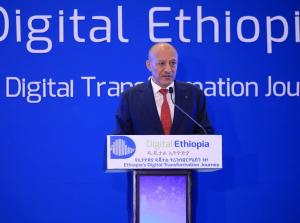

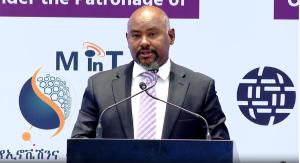
.jpg)
